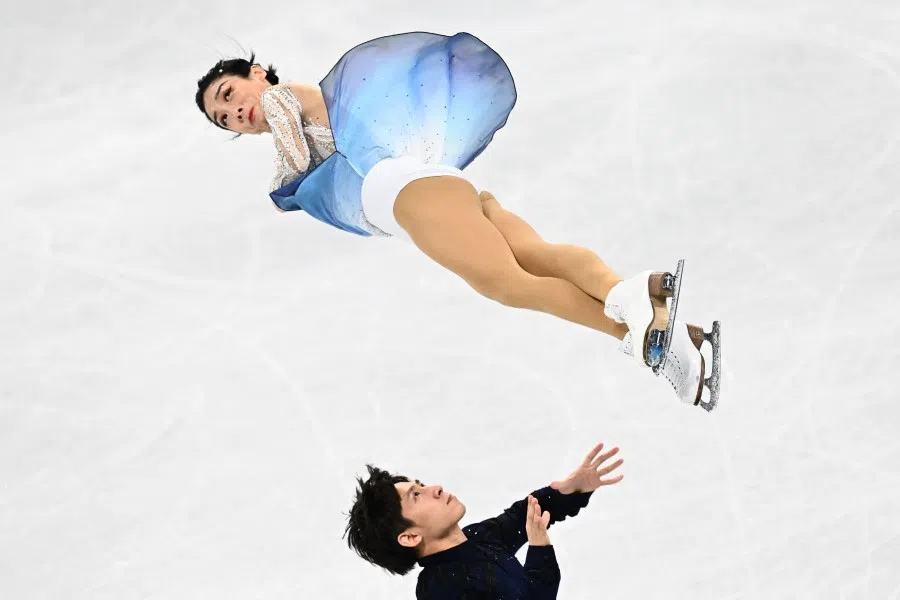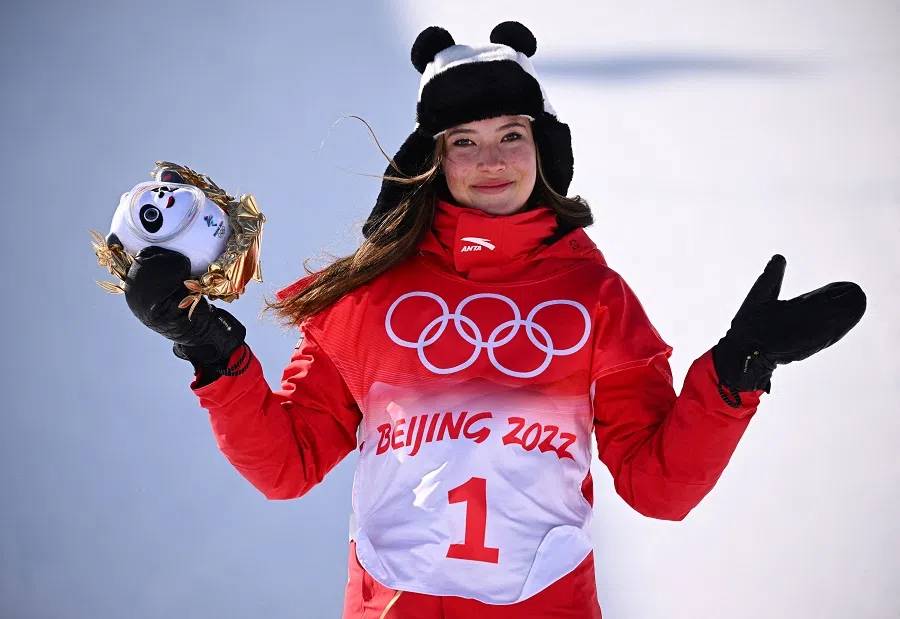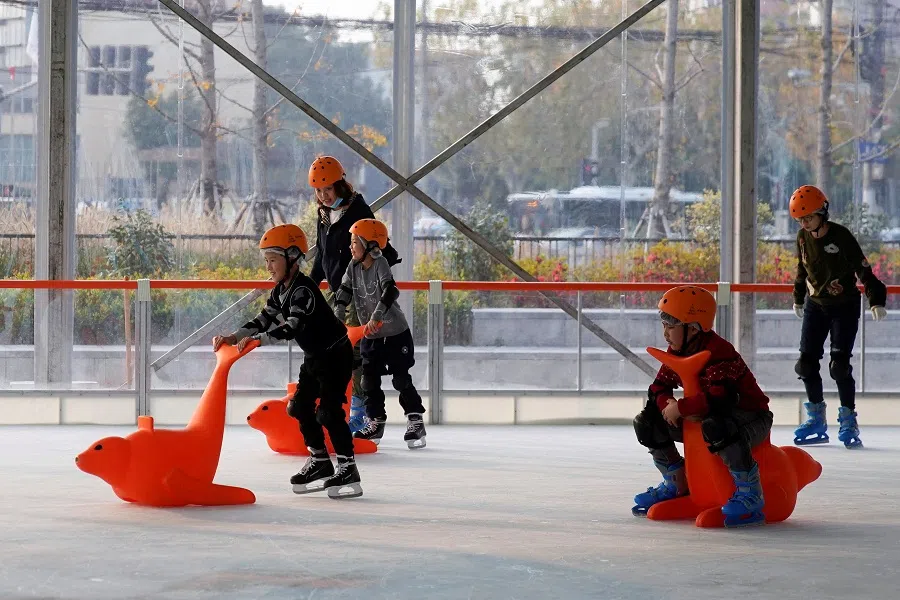Why China is the biggest winner of the 2022 Winter Olympics
Zaobao correspondent Yu Zeyuan feels that the Beijing Winter Olympics has turned out much better than what was initially expected. Despite diplomatic boycotts by some Western countries and political bickering about China's human rights issues, the Chinese are more than pleased with the event. Not only did China give its best-ever showing at a Winter Olympics, it also pulled off a decent event despite the pandemic, and has generated great interest in winter sports among the Chinese public.

After about two weeks of intense competition, the Beijing Winter Olympics drew to a close at the National Stadium or "Bird's Nest" on 20 February. China placed third in the medal standings with nine golds, its best-ever showing at a Winter Olympics.
China's last gold came from the figure skating pair Sui Wenjing and Han Cong. On the evening of 19 February at the Capital Indoor Stadium, they were the final pair to compete, following strong scores from the three Russian pairs before them. However, they held up against the pressure, pulled off a difficult quadruple twist lift and scored a total of 239.88, taking gold from the Russians.
The figure skating pairs competition is one of the most highly watched ice sports events, and the win by Sui and Han ignited the enthusiasm of Chinese viewers.

Previously, the glitz of the opening ceremony, the outstanding performances of freestyle skier Eileen Gu (born to a Chinese mother and an American father) and local-born snowboarding talent Su Yiming had pushed the Olympics frenzy to new heights.
While the Beijing Winter Olympics was held in a "closed loop" due to the pandemic, its appeal and impact on Chinese audiences was still able to rival that of the 2008 Beijing Summer Olympics. One might say that China is the biggest winner of this year's Winter Olympics.
Besides the mainstream state media, many in China also felt that the country had no foundation in winter sports, while the closed loop meant fewer venue spectators, and most people might not be interested.
Nevertheless, before the start of the Games, international opinion was pessimistic, and even some in China were not very confident about this year's Winter Olympics happening at their doorstep.
As a result of the diplomatic boycotts by the US and other Western countries, Western political figures did not attend the event. Furthermore, the international mainstream narrative linked the Winter Olympics to human rights issues and criticised China's dynamic zero-Covid measures, casting a pall on the event.
Besides the mainstream state media, many in China also felt that the country had no foundation in winter sports, while the closed loop system meant fewer venue spectators, and most people might not be interested.
However, the outcome was unexpected.
China the big winner at the Olympics
A Global Times Research Center survey found that 99.6% of respondents in China watched the Winter Olympics, either live, via replays or on-demand video clips. Olympic Broadcasting Services CEO Yiannis Exarchos also said to the media on 10 February that a record number of viewers watched the Beijing Winter Olympics compared with previous Winter Games.

The Chinese public's strong interest in the Winter Olympics can be seen in the enormous popularity of the mascot Bing Dwen Dwen. Even now that the Winter Olympics has closed, it is almost impossible to get Bing Dwen Dwen souvenirs whether online or offline. This did not happen even during the 2008 Beijing Summer Olympics.
The Eileen Gu phenomenon is a symbol of success for the Beijing Winter Olympics, showing that the Games has fired up interest and passion for winter sports among the Chinese, especially the younger generation.
Gu, with two golds and one silver medal, became the people's idol. On 19 February, she appeared on her first live stream on social media app Douyin, garnering 16 million viewers and 120 million likes, while accumulating over 17 million followers.
The Eileen Gu phenomenon is a symbol of success for the Beijing Winter Olympics, showing that the Games has fired up interest and passion for winter sports among the Chinese, especially the younger generation. This is the greatest achievement of the Winter Olympics.
China's vision to involve 300 million people in winter sports was proposed as part of its bid to host the Winter Olympics. Based on official statistics, China has realised this goal and received the approval of International Olympic Committee president Thomas Bach.
Giving winter sports a leg up
Bach said at a press briefing on 18 February that one of China's greatest contributions to the Olympic Games is that it engaged 300 million people in winter sports, opening up a whole new world for ice and snow sports and completely changing the future landscape of winter sports globally.

Following the opening ceremony of the Beijing Winter Olympics, winter sports have become popular leisure activities across various Chinese cities, especially in the northern regions, where winter sports are the people's top choice of activity during the holidays.
To meet the demand, indoor skating rinks and ski resorts sprouted up across several Chinese cities. China's winter sports industrial chains such as winter sports equipment manufacturing and winter sports training have also greatly benefited from the increasing popularity of winter sports. Orders for some snowboard manufacturers have also been fully booked for the year.
Another highlight of the recently concluded Winter Olympics was the large number of naturalised athletes competing for China. Apart from superstar Gu, there were also many other naturalised athletes who represented China at the Games.
Just among China's ice hockey teams alone, 13 out of 23 players on the women's team and 15 out of 25 players on the men's team were naturalised players. Some of them were of Chinese descent, while others were of mixed race.
China's women's ice hockey team accomplished amazing feats of beating strong competitor Denmark by 3-1 and defeating Japan in a penalty shootout. While the Chinese men's ice hockey team failed to win a game, their performance had also gained the approval of the viewers.

After a match against the US, Canada-born Brandon Yip, captain of the Chinese men's ice hockey team, said, "If a Chinese ice hockey player will stand on the podium in 20 years and say he plays the sport because he 'watched the Games in 2022'. That will be the success for our generation."
The Beijing Winter Olympics have made Chinese officials and people aware of the advantages of attracting talent, which encourages China to attract more talents from more sectors and further open up in the future.
The Chinese people are generally tolerant and accepting of naturalised athletes, as clearly seen in their love for Gu. While naturalised figure skater Beverly Zhu Yi underperformed and received some criticism, Chinese public opinion affirmed her efforts and cheered her on all the same.
While Chinese officials have always focused on attracting foreign talent to boost the fields of technology and economy, the outstanding performance of Gu and other naturalised athletes have also shown China the benefits of attracting sports talents.
The Beijing Winter Olympics has made Chinese officials and people aware of the advantages of attracting talent, which encourages China to attract more talents from more sectors and further open up in the future. This is also another major benefit that the Games have brought to China. Related: Will political bickering overshadow sports events at the Beijing Winter Olympics? | China has a zero-Covid policy. Can it pull off a spectacular Winter Olympics? | Media coverage of Beijing Winter Olympics shows parallel worlds | China's love-hate relationship with naturalised athletes | Beijing Olympics diplomatic boycott: Does China care?





